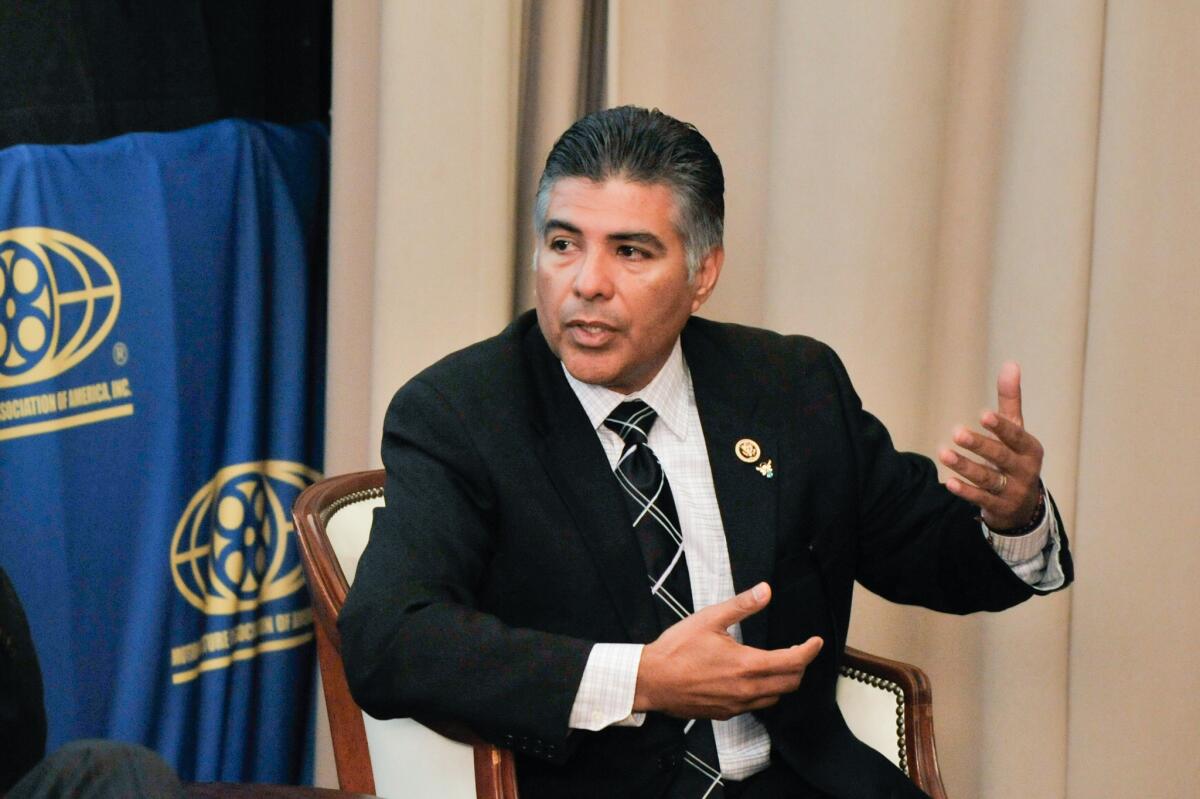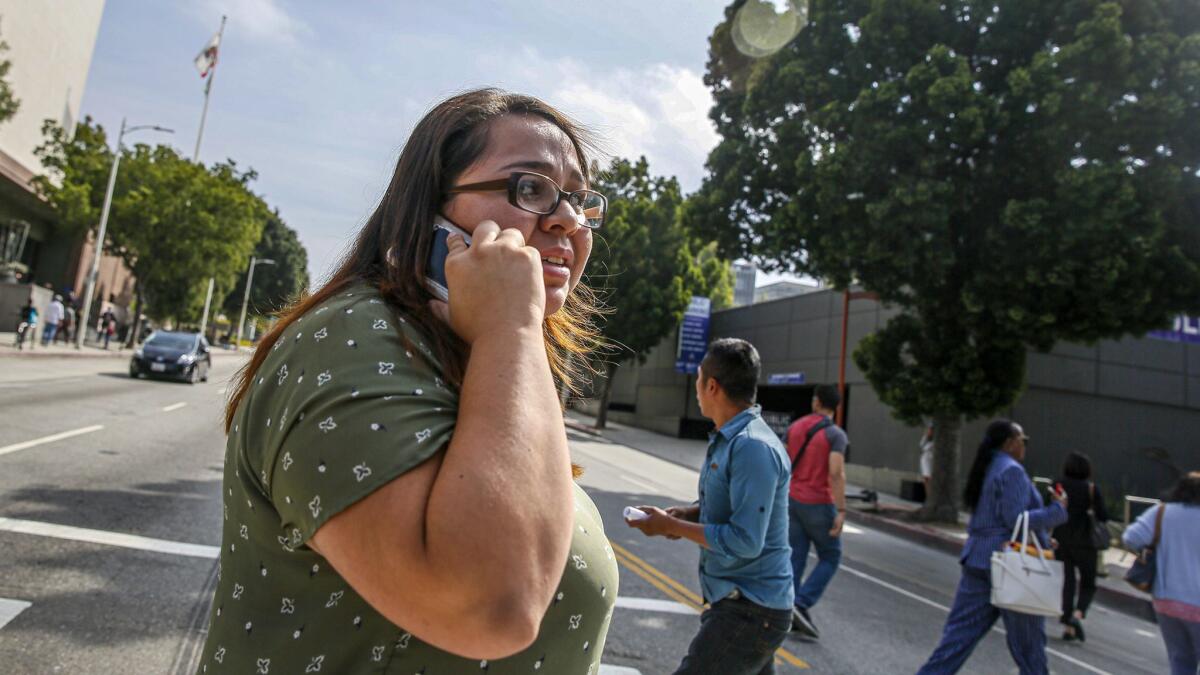Woman who said Congressman Tony Cardenas molested her as a teenager drops lawsuit

The sexual assault case filed against U.S. Rep. Tony Cardenas collapsed on Wednesday, with the congressman’s accuser dropping her lawsuit and saying she regretted hiring her attorney to represent her in the proceedings.
Angela Villela Chavez, who had accused Cardenas of molesting her when she was 16, agreed in court to have her lawsuit dismissed with prejudice, a move that will prevent her from refiling the case.
Lawyers for the congressman said after the hearing that they had achieved “total vindication” for their client. Cardenas, in turn, welcomed the resolution of the case, saying “the truth prevailed.”
“I humbly thank my family, community, and constituents who know I am a person of integrity,” he said in a statement.
It was an abrupt end to an incendiary case that, according to Chavez, was inspired in part by the #MeToo movement, which has surfaced incidents of sexual harassment and abuse by celebrities and politicians.
The two sides reached their agreement two months after Chavez’s attorney, Lisa Bloom, said her firm needed to drop out of the case for unspecified reasons. Chavez, now 28, told The Times after Wednesday’s hearing that she never would have come forward with her allegations without her lawyer’s “confidence and backing.”
“I regret my decision in choosing her as my attorney,” said Chavez, who now lives in Lancaster.
Lawyers for Cardenas, who represents much of the San Fernando Valley, said the agreement between the two sides was a resolution, not a settlement. As part of the deal, Cardenas will not pay Chavez any money but also will not sue her for malicious prosecution, they said.
Patricia Glaser, an attorney for Cardenas, said she was proud he stood up to “false allegations.”
“America has become a place where, it’s not what you can prove, it’s what you can allege, and it’s not right,” she said in an interview. “We can’t be a nation that has a justice system where all you have to do is allege something and it becomes the truth.”
Superior Court Judge Steven Kleifield dismissed the case with prejudice and relieved Bloom from serving as Chavez’s attorney.
Asked about the statement from her client, Bloom said she was forced to withdraw for “ethical reasons, which the judge recognized.”
“Ms. Chavez has been through a very tough experience and I wish her all the best,” Bloom said in an email.
Chavez had alleged in her lawsuit that Cardenas had molested her in 2007, when she was a rising junior golf star, after she collapsed at a country club in Cheviot Hills. She said the incident occurred while Cardenas, then a councilman, was driving her to a hospital.
Chavez also claimed that Cardenas had given her ice water with a peculiar taste shortly before she collapsed.

Cardenas, one of the highest-ranking Latino members of Congress, vigorously denied the allegations. Glaser described his accuser as the daughter of a disgruntled ex-employee and said she expected her client to be fully exonerated.
Chavez filed her case in April 2018. Although she was initially identified as a Jane Doe, she later revealed her identity, saying she had been inspired by Christine Blasey Ford’s accusations against now-Supreme Court Justice Brett M. Kavanaugh.
After the lawsuit was filed, no one else stepped forward with similar allegations against Cardenas, who took office in 2013. He largely weathered the controversy, unlike several other politicians accused of sexual misconduct.
Assemblyman Raul Bocanegra (D-Pacoima) stepped down in 2017 after The Times reported that six women had accused him of making unwanted physical advances or communications. Assemblyman Matt Dababneh (D-Woodland Hills) resigned that same year after being accused of masturbating in front of a lobbyist. He is now suing one of his accusers.
Despite calls for Cardenas to resign, from Los Angeles school board member Kelly Gonez and a handful of activists, he easily won reelection last year.
The first major sign of trouble for Chavez’s case came in May, when at least one of her lawyers left Bloom’s firm. Later, Bloom revealed that she wanted the judge to release her from the case.
Bloom declined to reveal the precise reason for her request, saying only that such a move was required under the State Bar’s Rules of Professional Conduct. Weeks later, Chavez told a judge she opposed Bloom’s effort to drop her as a client.
The State Bar’s conduct rules offer a handful of scenarios in which lawyers must end their representation of a client.
For example, attorneys must stop representing a client if they conclude that the client is bringing an action that is “without probable cause” and is being pursued “for the purpose of harassing or maliciously injuring any person.”
Lawyers also must withdraw if they know, or reasonably should know, that their representation would violate State Bar rules. In addition, lawyers must end their relationship with a client if they are not physically or mentally well enough to continue providing effective representation.
When Wednesday’s court hearing began, Bloom noted that a Times reporter was in the courtroom and asked for the parties in the case to speak privately in the judge’s chambers. After roughly 10 minutes, they emerged and began trying to track down the congressman.
Eventually, the judge got Cardenas on speakerphone and asked him if he agreed with the terms of the proposal for resolving the case. Cardenas said he did. The judge then agreed to release Bloom as Chavez’s attorney.
Twitter: @DavidZahniser
More to Read
Sign up for Essential California
The most important California stories and recommendations in your inbox every morning.
You may occasionally receive promotional content from the Los Angeles Times.











